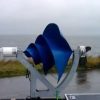The Ohio Department of Natural Resources (ODNR) is urging residents across the state to conserve water amid ongoing drought conditions. More than 75% of Ohio is experiencing varying degrees of drought, which is affecting agricultural production, water supply, wildlife, and even recreational activities.
With shared water resources becoming scarce, the ODNR highlights the wide-reaching consequences of drought in its latest report. Cleveland has seen 12 consecutive days without rain, and southeastern Ohio is facing even harsher conditions, prompting natural disaster declarations in several counties.
Drought conditions are worsening across northern, central, and western Ohio, with predictions indicating they may continue to expand in the coming weeks. Southeastern Ohio, where drought has reached extreme levels, is currently the hardest hit, but the lack of rain is having a widespread impact on river navigation, municipal water supplies, and overall water quality.

While meteorologists predict a chance of rain this Saturday and a better chance next week, the drought is expected to persist, leading to growing concern among state officials.
In response, the ODNR has shared several tips for conserving water in households. In the bathroom, residents can reduce water usage by taking shorter showers and turning off the tap while brushing teeth or shaving. Filling the bathtub halfway and avoiding the toilet as a trash can also help save water.
In the kitchen and laundry room, people are encouraged to only wash full loads, use cold water for laundry, and consider air-drying clothes. Using a jug of water in the fridge instead of running the tap until it cools can also prevent waste.
Outdoor water use can be minimized by only watering lawns when necessary and doing so during the cooler parts of the day, such as mornings or evenings. Residents are advised to raise their lawnmower blades to reduce stress on grass and plant native species that require less water. Collecting rainwater for irrigation and using brooms to clean outdoor areas instead of hoses are also practical ways to conserve. Additionally, self-closing hose nozzles can prevent unnecessary water use.
To further reduce water consumption, the ODNR recommends fixing household leaks, which can account for significant water waste. Installing water-efficient fixtures, like those certified by the U.S. EPA’s WaterSense program, is another effective measure.
With the drought forecasted to continue, Ohioans are being urged to take immediate steps to conserve water, and while some rain is expected next week, it may only provide temporary relief from the dry conditions currently gripping the state.

